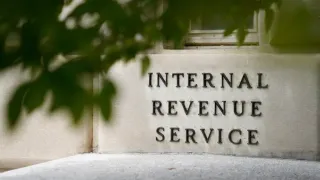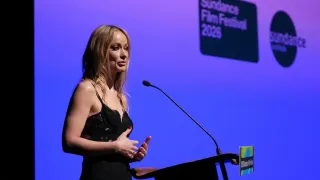February 5, 2017
Tehran Tremblors
David Lamble READ TIME: 2 MIN.
"The Salesman," an emotionally provocative family film from one of Iran's most notable young filmmakers, Asghar Farhadi, opens in chaos as family members scramble to evacuate a Tehran apartment complex rocked by an earthquake. Rana, the outspoken wife and theater partner of the film's male protagonist Emad, greets her surviving spouse with an edgy barb that sets the tone for the unraveling of both their personal and professional relationships. "Still alive then? I thought we'd have to dig you out of the rubble."
Later her hubby confides his disappointment to his work buddy, Babak.
Emad: "I'd like to bring a loader and ruin all of this city."
Babak: "They ruined this city once, but then they built it again, and now this is it."
The couple moves into a second flat, unaware it was once home to a prostitute, some of whose clients have yet to realize their old stomping ground has undergone its own seismic change. The intrusion of one of them, an overweight working man, brings matters to a head. The film's title, "The Salesman," is homage to the towering 1949 work by the iconic American playwright Arthur Miller. Emad learns just how closely the vocational and life-threatening problems of Miller's Willy Loman will come to parallel his own, both at home and at work.
Film buffs will remember Farhadi for his 2011 Best Foreign Language Film Oscar winner "A Separation," an absorbing drama that examined another troubled middle-class family. It's one of this filmmaker's strengths that his characters' foibles resonate both privately and against the landscape of a severely repressive theocratic state. Keenly aware that their creative freedom is hostage to the whims of religious authorities, Iranian film artists like Farhadi are often able to create complex arguments for individual autonomy that put many privileged Western artists to shame.
The acting of the leads, Farhadi veteran Shahab Hosseini as Emad and Taraneh Alidoosti as Rana, demonstrates that even a repressive patriarchal society like today's Iran can produce feisty women capable of giving bullying men a run for their money. While "The Salesman" mostly unfolds in the pressure cooker of Emad and Rana's workspace home, there is a deft subplot in which we see Emad in his other role as a high school drama teacher, tutor to a rambunctious all-male theater class. The students, hirsute and scruffy, constantly bait their instructor, pushing the boundaries of their upper middle-class privilege to the limits.
Farhadi said in a recently published interview that the late-1940s NYC setting of "Death of a Salesman" reminded him of his hometown. "Tehran today is very close to New York as described by Miller. A town whose face is changing at a heady pace, destroying everything that's old, orchards and gardens, to replace them with towers. This is exactly the environment the salesman lives in. Tehran is changing in a frenetic, anarchic, irrational way."






